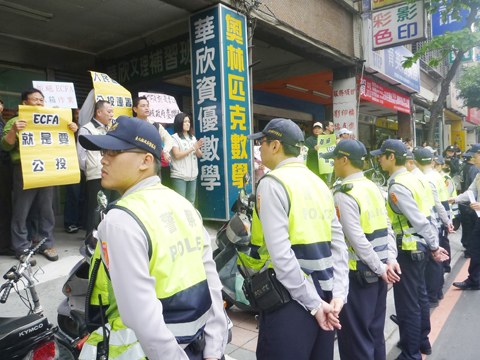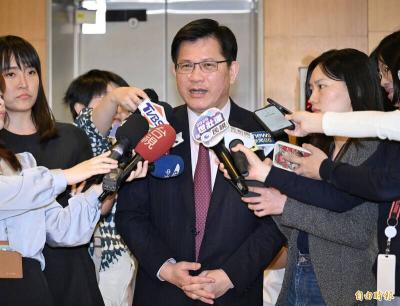President Ma Ying-jeou (馬英九) yesterday defined the proposed economic cooperation framework agreement (ECFA) as a major economic strategy to connect Taiwan with the world and said an ECFA would bring more economic cooperation between Taiwan and other countries.
“The economic pact Taiwan will sign with China is a major economic strategy. It will lead Taiwan to stop shutting doors and instead connect with the world,” Ma said at Taipei County’s Hsiu Lang Elementary School as part of his nation-wide tour to drum up support for the pact.
Vice Premier Eric Chu (朱立倫), Minister of Economic Affairs Shih Yen-Shiang (施顏祥) and officials from the Council of Agriculture, the Council of Labor Affairs and the Mainland Affairs Council also attended the event.

PHOTO: PAN HSING-HUI, TAIPEI TIMES
The Straits Exchange Foundation and the Association of Relations Across the Taiwan Strait completed a second round of negotiations on an ECFA in Taoyuan last month and are scheduled to hold the next round in China at the end of this month.
The Ma administration hopes to sign an ECFA in June.
Insisting that an ECFA would have a positive impact on Taiwan’s economy, Ma said that after signing an ECFA, other countries — including Japan and the US — would follow China’s example to strengthen economic cooperation with Taiwan.
Ma again promised not to allow more Chinese agricultural products into the local market and to maintain a ban on Chinese labor workers in Taiwan.
In response to calls by the Democratic Progressive Party (DPP) to hold a referendum on an ECFA, Ma said that while he did not oppose the idea, the government had no authority to initiate a proposal to hold a referendum.
“We will let the legislature oversee the cross-strait economic pact and make the process transparent,” he said.
Challenges over the government’s signing of an ECFA, however, continued as former president Lee Teng-hui (李登輝) yesterday accused the Ma administration of ignoring public opposition and criticized its acceptance of Beijing’s version of the trade pact at the negotiations.
“I ask President Ma: Where is your proposal? How is it a negotiation when we don’t have a proposal and embrace China’s version instead?” he asked at the opening ceremony of a Lee Teng-hui School in Taipei County.
Lee rebutted Ma’s argument that signing an ECFA would help Taiwan sign free-trade agreements with other countries, adding that Taiwan should negotiate economic pacts with other countries as a member of the WTO.
He also said China was using an ECFA to unify Taiwan, urging the government not to fully depend on China.
“Economic cooperation is only the first step after signing an ECFA. Cultural and educational exchanges will follow — and then the politics. This is how China would eventually swallow Taiwan,” Lee said.
Other critics say the trade agreement would cause massive unemployment in Taiwan, make it too economically dependent on China and lead to an influx of Chinese capital and goods.
DPP Chairperson Tsai Ing-wen (蔡英文) is scheduled to debate Ma on an ECFA on April 25.

Taiwan would welcome the return of Honduras as a diplomatic ally if its next president decides to make such a move, Minister of Foreign Affairs Lin Chia-lung (林佳龍) said yesterday. “Of course, we would welcome Honduras if they want to restore diplomatic ties with Taiwan after their elections,” Lin said at a meeting of the legislature’s Foreign Affairs and National Defense Committee, when asked to comment on statements made by two of the three Honduran presidential candidates during the presidential campaign in the Central American country. Taiwan is paying close attention to the region as a whole in the wake of a

Chinese Nationalist Party (KMT) Chairman Eric Chu (朱立倫), spokeswoman Yang Chih-yu (楊智伃) and Legislator Hsieh Lung-chieh (謝龍介) would be summoned by police for questioning for leading an illegal assembly on Thursday evening last week, Minister of the Interior Liu Shyh-fang (劉世芳) said today. The three KMT officials led an assembly outside the Taipei City Prosecutors’ Office, a restricted area where public assembly is not allowed, protesting the questioning of several KMT staff and searches of KMT headquarters and offices in a recall petition forgery case. Chu, Yang and Hsieh are all suspected of contravening the Assembly and Parade Act (集會遊行法) by holding

President William Lai (賴清德) has appointed former vice president Chen Chien-jen (陳建仁) to attend the late Pope Francis’ funeral at the Vatican City on Saturday on his behalf, the Ministry of Foreign Affairs said today. The Holy See announced Francis’ funeral would take place on Saturday at 10am in St Peter’s Square. The ministry expressed condolences over Francis’ passing and said that Chen would represent Taiwan at the funeral and offer condolences in person. Taiwan and the Vatican have a long-standing and close diplomatic relationship, the ministry said. Both sides agreed to have Chen represent Taiwan at the funeral, given his Catholic identity and

Taiwan would welcome the return of Honduras as a diplomatic ally if the next president of that country decides to make such a move, Minister of Foreign Affairs Lin Chia-lung (林佳龍) said today. “We would welcome Honduras if they want to restore diplomatic ties with Taiwan after their elections,” Lin said during a legislative hearing. At the same time, Taiwan is paying close attention to the Central American region as a whole, in the wake of a visit there earlier this year by US Secretary of State Marco Rubio, Lin said. Rubio visited Panama, El Salvador, Costa Rica and Guatemala, during which he